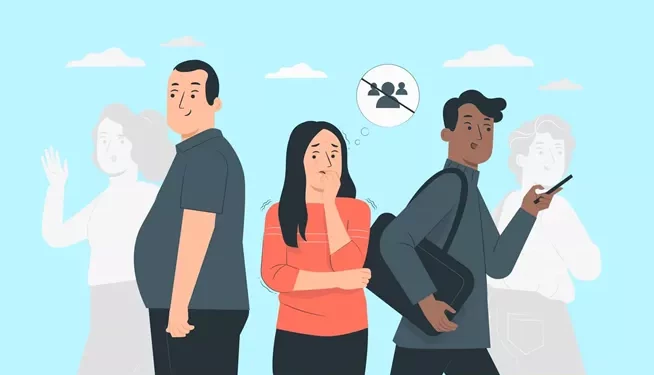Social phobia anxiety, also known as social anxiety disorder (SAD), is a common mental health condition that affects many people worldwide. Individuals with this condition often experience intense fear or anxiety in social situations, especially when they have to interact with others or perform in front of people. This anxiety can be so overwhelming that it can interfere with everyday activities, relationships, and career success.
In this article, we will explore social phobia anxiety in detail, including its symptoms, causes, treatments, and related topics.
Understanding Social Phobia Anxiety
Social phobia anxiety is more than just shyness or feeling nervous in social situations. It is a persistent fear of being judged, embarrassed, or humiliated in public. People with this disorder worry excessively about how others perceive them, leading them to avoid social interactions altogether.
This condition can develop in childhood or adolescence and often persists into adulthood. It is not something that can be simply “overcome” by willpower or positive thinking. For many individuals, social anxiety can be debilitating, affecting their quality of life and their ability to function in social and professional settings.
Symptoms of Social Phobia Anxiety
The symptoms of social phobia anxiety can vary from person to person. However, common signs and symptoms include:
Physical Symptoms
-
Sweating: Excessive sweating when in social situations.
-
Trembling or Shaking: Uncontrollable shaking or trembling in the presence of others.
-
Racing Heart: An increased heart rate or palpitations when faced with social interactions.
-
Stomach Issues: Upset stomach, nausea, or even diarrhea in stressful social settings.
-
Dry Mouth: A feeling of dryness in the mouth or difficulty speaking.
Emotional Symptoms
-
Intense Fear of Judgment: A constant worry about being judged or criticized.
-
Fear of Embarrassment: Anxiety about making mistakes or saying something wrong in front of others.
-
Self-Consciousness: An overwhelming sense of being watched or scrutinized by others.
-
Avoidance: Avoiding social situations altogether to prevent potential embarrassment.
Behavioral Symptoms
-
Avoiding Eye Contact: Difficulty making eye contact with others due to fear of being noticed.
-
Speech Difficulties: Struggling to speak clearly or avoiding speaking altogether in social situations.
-
Isolating Yourself: Withdrawing from social activities to avoid confrontation or fear of judgment.
Causes of Social Phobia Anxiety
While the exact cause of social phobia anxiety is unknown, several factors may contribute to its development. These include:
Genetics
There is evidence to suggest that social anxiety disorder can run in families. If you have a close family member with the condition, you may be more likely to develop it yourself.
Brain Chemistry
Imbalances in certain chemicals in the brain, such as serotonin, may contribute to the development of social anxiety. These imbalances can affect mood, behavior, and stress responses.
Life Experiences
Stressful or traumatic experiences, such as bullying, public humiliation, or negative childhood experiences, can increase the risk of developing social phobia anxiety.
Personality Traits
People with certain personality traits, such as being naturally shy or introverted, may be more susceptible to social anxiety. However, not all introverts develop social phobia anxiety.
Treatment for Social Phobia Anxiety
Social phobia anxiety is a treatable condition. The main treatment options for this disorder include therapy, medication, and lifestyle changes.
1. Cognitive-Behavioral Therapy (CBT)
CBT is one of the most effective forms of therapy for treating social phobia anxiety. This type of therapy focuses on identifying and changing negative thought patterns and behaviors that contribute to anxiety. CBT helps individuals confront their fears in a safe and structured way, allowing them to gradually build confidence in social situations.
2. Exposure Therapy
Exposure therapy is a technique used to help individuals gradually face their fears in real-life situations. By starting with less anxiety-provoking scenarios and slowly working up to more challenging social interactions, individuals can reduce their fear and build resilience.
3. Medication
In some cases, medication may be prescribed to help manage the symptoms of social anxiety disorder. Common medications include:
-
Selective Serotonin Reuptake Inhibitors (SSRIs): These medications help regulate serotonin levels in the brain, improving mood and reducing anxiety.
-
Benzodiazepines: These medications can provide short-term relief from anxiety but are typically used only in specific cases due to their potential for dependence.
-
Beta-Blockers: These medications can help control the physical symptoms of anxiety, such as trembling and rapid heart rate, during social situations.
4. Lifestyle Changes
Certain lifestyle changes can also help manage social anxiety, such as:
-
Regular Exercise: Physical activity can reduce stress and improve mood.
-
Mindfulness and Relaxation Techniques: Practices like meditation, deep breathing, and yoga can help calm the mind and reduce anxiety.
-
Social Skills Training: Developing better social skills can increase confidence and reduce anxiety in social settings.
Coping Strategies for Social Phobia Anxiety
In addition to formal treatment, there are several strategies that individuals with social phobia anxiety can use to cope with their symptoms:
1. Practice Self-Compassion
It’s important to be kind to yourself when experiencing social anxiety. Instead of focusing on perceived failures or mistakes, practice self-compassion by acknowledging your progress and treating yourself with care.
2. Set Realistic Goals
Start with small, manageable goals in social situations, such as making eye contact or initiating a brief conversation. Gradually work your way up to more challenging interactions.
3. Focus on Others, Not Yourself
In social situations, try shifting your focus away from yourself and onto others. Ask questions, listen actively, and show interest in what others have to say. This can help reduce the pressure you feel to perform or be perfect.
4. Seek Support
Talking to others who understand your struggles can be helpful. Support groups, online communities, or talking to a therapist can provide comfort and encouragement.
When to Seek Professional Help
If social phobia anxiety is interfering with your ability to function in daily life—whether in work, school, or personal relationships—it may be time to seek professional help. A mental health professional can provide guidance and develop a treatment plan tailored to your needs.
Related Topics:



























